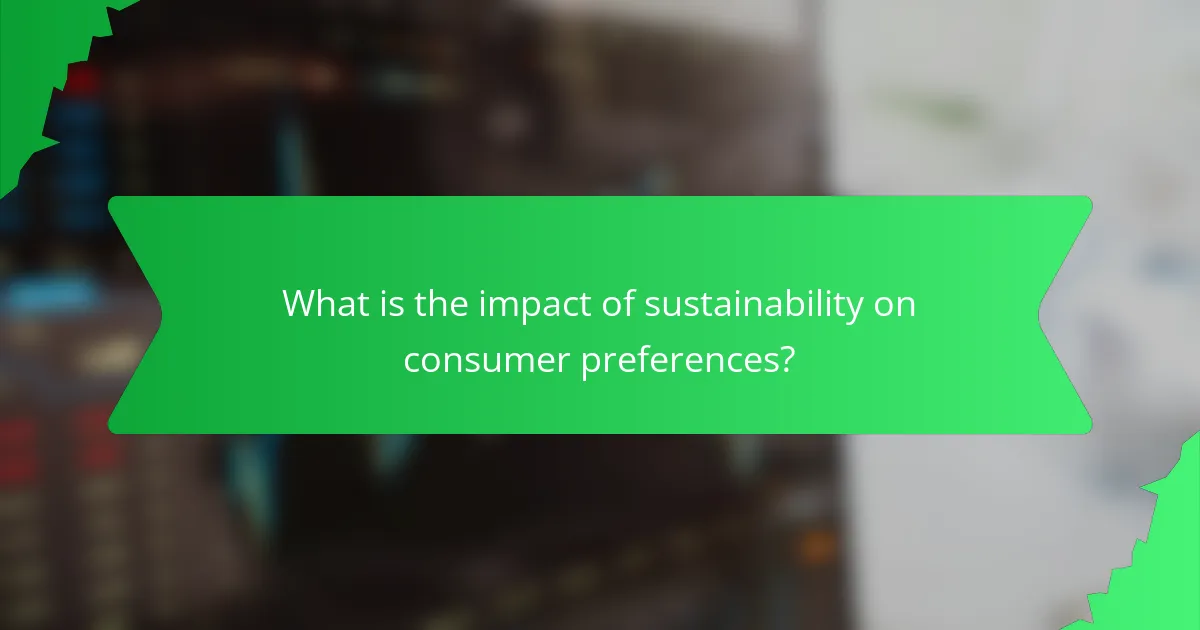Sustainability trends in entrepreneurship platforms highlight a growing commitment to eco-friendly practices and social responsibility. Key developments include the adoption of circular economy principles, increased focus on sustainable supply chain management, and investment in green technologies. Consumer preferences are shifting towards sustainable products, with a significant percentage willing to pay more for eco-conscious options. Challenges such as lack of awareness, financial constraints, and supply chain complexities hinder the transition to sustainable business models. Overall, these trends reflect a broader movement towards sustainability in the entrepreneurial landscape, significantly influencing purchasing decisions and brand loyalty.

What are the current sustainability trends in entrepreneurship platforms?
Current sustainability trends in entrepreneurship platforms include increased focus on eco-friendly practices and social responsibility. Many platforms are adopting circular economy principles. This involves minimizing waste and promoting recycling. Additionally, there is a rise in sustainable supply chain management. Entrepreneurs are prioritizing suppliers who follow sustainable practices.
Consumer preferences are also shifting towards sustainability. A 2021 survey by McKinsey found that 70% of consumers are willing to pay more for sustainable products. This trend encourages platforms to feature eco-conscious brands. Moreover, there is a growing emphasis on transparency in business operations. Platforms are providing consumers with information about the sustainability of products.
Investment in green technologies is another key trend. Many entrepreneurship platforms are supporting startups focused on renewable energy and sustainable innovations. These trends reflect a broader movement towards sustainability in the business landscape.
How are eco-friendly practices being integrated into entrepreneurship platforms?
Eco-friendly practices are increasingly integrated into entrepreneurship platforms through various strategies. Many platforms now prioritize sustainable business models in their guidelines. This includes promoting eco-friendly products and services, which helps attract environmentally conscious consumers.
Additionally, platforms are incorporating features that allow businesses to offset their carbon footprints. This is achieved through partnerships with carbon offset programs. Many platforms also provide resources and tools for entrepreneurs to adopt sustainable practices in their operations.
For example, some platforms offer educational content on sustainability. This helps entrepreneurs understand the benefits of eco-friendly practices. Research shows that consumers prefer brands with sustainability commitments, influencing platform policies.
According to a survey by Nielsen, 66% of global consumers are willing to pay more for sustainable brands. This consumer preference drives platforms to integrate eco-friendly practices more deeply into their ecosystems.
What specific eco-friendly practices are entrepreneurs adopting?
Entrepreneurs are adopting several specific eco-friendly practices. Many are implementing sustainable sourcing for their materials. This involves choosing suppliers that prioritize environmental responsibility. Additionally, entrepreneurs are utilizing renewable energy sources for their operations. Solar and wind energy are common choices. Waste reduction strategies are also being adopted. This includes recycling and composting initiatives within their businesses. Furthermore, companies are focusing on eco-friendly packaging solutions. Biodegradable and recyclable materials are preferred over plastic. Many entrepreneurs are also promoting a circular economy model. This practice encourages reusing and repurposing products. These eco-friendly practices contribute to a reduced carbon footprint and enhance brand reputation.
How do these practices impact the overall sustainability of entrepreneurship platforms?
Eco-friendly practices enhance the overall sustainability of entrepreneurship platforms. They reduce environmental impact through lower resource consumption and waste generation. Sustainable practices attract consumers who prioritize eco-friendliness. Research shows that 66% of global consumers are willing to pay more for sustainable brands (Nielsen, 2015). This consumer preference drives platforms to adopt green practices. Consequently, businesses can achieve long-term viability and competitive advantage. Sustainable entrepreneurship also fosters community engagement and social responsibility. These factors collectively strengthen the platform’s market position and resilience.
Why is sustainability important for entrepreneurship platforms?
Sustainability is crucial for entrepreneurship platforms because it fosters long-term viability and consumer trust. Sustainable practices attract environmentally conscious consumers. In fact, a Nielsen report states that 66% of global consumers are willing to pay more for sustainable brands. Additionally, sustainability can lead to cost savings through efficient resource use. Companies that adopt eco-friendly practices often experience improved brand loyalty. Furthermore, regulatory pressures are increasing, making sustainability a necessary compliance factor. Overall, integrating sustainability can enhance competitive advantage and drive innovation in entrepreneurship platforms.
What are the long-term benefits of sustainable practices for entrepreneurs?
Sustainable practices provide long-term benefits for entrepreneurs, including cost savings, enhanced brand reputation, and increased customer loyalty. Implementing energy-efficient technologies can reduce operational costs significantly. According to a study by the Carbon Trust, businesses that adopt sustainable practices can save up to 20% on energy bills.
Moreover, consumers increasingly prefer brands that prioritize sustainability. Research from Nielsen shows that 66% of global consumers are willing to pay more for sustainable brands. Enhanced brand reputation leads to competitive advantages in the marketplace.
Sustainable practices also foster innovation, driving entrepreneurs to develop new products and services that meet evolving consumer demands. This innovation can lead to new revenue streams and market opportunities. In summary, sustainable practices yield financial, reputational, and innovative benefits for entrepreneurs in the long term.
How does sustainability influence brand reputation and consumer trust?
Sustainability significantly influences brand reputation and consumer trust. Brands that adopt sustainable practices often enhance their public image. This is because consumers increasingly prefer companies that prioritize environmental responsibility. Research shows that 66% of global consumers are willing to pay more for sustainable brands. Trust is built when brands transparently communicate their sustainability efforts. Consumers are more likely to remain loyal to brands that demonstrate genuine commitment to eco-friendly practices. A strong reputation for sustainability can lead to increased customer engagement and advocacy. Thus, sustainability is a critical factor in shaping brand perception and fostering consumer trust.

What is the impact of sustainability on consumer preferences?
Sustainability significantly influences consumer preferences. Consumers increasingly favor brands that prioritize eco-friendly practices. A 2021 Nielsen report found that 73% of global consumers are willing to change their consumption habits to reduce environmental impact. This shift is driven by heightened awareness of climate change and environmental issues. Younger consumers, especially Millennials and Gen Z, are more likely to support sustainable brands. They often seek transparency regarding sourcing and production methods. Additionally, sustainable products can command premium pricing, reflecting consumer willingness to pay more for eco-friendly options. Overall, sustainability shapes purchasing decisions and brand loyalty in today’s market.
How do consumer preferences shift towards eco-friendly products and services?
Consumer preferences are increasingly shifting towards eco-friendly products and services due to heightened environmental awareness. Studies indicate that 66% of global consumers are willing to pay more for sustainable brands. This shift is driven by factors such as climate change concerns and the desire for corporate responsibility. Younger generations, particularly Millennials and Gen Z, prioritize sustainability in their purchasing decisions. Research shows that 73% of Millennials are willing to pay extra for eco-friendly products. Additionally, companies that adopt sustainable practices often see increased customer loyalty. This trend is further supported by the rise of social media, where eco-conscious brands gain visibility and support. Overall, consumer preferences are aligning with eco-friendly values, influencing market trends significantly.
What factors contribute to consumers’ preference for sustainable brands?
Consumers prefer sustainable brands due to their environmental impact, ethical practices, and social responsibility. These brands often use eco-friendly materials, reducing waste and pollution. Transparency in sourcing and production processes builds trust with consumers. Additionally, many consumers are motivated by a desire to support local economies and fair labor practices. Research shows that 66% of global consumers are willing to pay more for sustainable brands. This preference is driven by increasing awareness of climate change and its effects. Social media also plays a role in shaping perceptions of sustainability. Brands that engage in authentic storytelling about their sustainability efforts resonate more with consumers.
How does consumer awareness affect purchasing decisions in entrepreneurship?
Consumer awareness significantly influences purchasing decisions in entrepreneurship. Informed consumers tend to prefer brands that align with their values, particularly regarding sustainability. Research indicates that 73% of millennials are willing to pay more for sustainable products. This trend compels entrepreneurs to adopt eco-friendly practices to attract these consumers. Increased awareness leads to higher demand for transparency in sourcing and production processes. As a result, businesses that actively communicate their sustainability efforts often experience increased customer loyalty. Furthermore, consumer awareness can drive innovation as entrepreneurs seek to meet evolving preferences.
What role do entrepreneurship platforms play in shaping consumer behavior?
Entrepreneurship platforms significantly influence consumer behavior by promoting sustainable practices. These platforms connect consumers with eco-friendly products and services. They often highlight the environmental benefits of these offerings. This visibility encourages consumers to make more informed purchasing decisions. Research indicates that consumers are increasingly prioritizing sustainability in their choices. According to a Nielsen report, 66% of global consumers are willing to pay more for sustainable brands. By facilitating access to sustainable options, entrepreneurship platforms shape consumer preferences toward eco-conscious products. This trend reflects a broader shift in consumer values towards sustainability and social responsibility.
How can platforms educate consumers about sustainability?
Platforms can educate consumers about sustainability through interactive content and resources. They can offer online courses that cover sustainable practices and their benefits. Infographics can visually explain complex sustainability concepts. Blogs can showcase success stories of sustainable businesses. Webinars can feature experts discussing environmental issues. Social media campaigns can raise awareness about sustainability initiatives. Collaborations with eco-friendly brands can provide consumers with practical examples. Surveys can gather consumer insights to tailor educational content.
What are effective strategies for platforms to promote eco-friendly options?
Platforms can effectively promote eco-friendly options by implementing targeted marketing strategies. These strategies include highlighting the environmental benefits of products. Platforms can use social media campaigns to raise awareness about eco-friendly choices. Collaborating with eco-conscious influencers can amplify their message. Providing clear information on product sourcing and sustainability practices is crucial. Offering incentives for choosing eco-friendly options can encourage consumer participation. Additionally, creating educational content around sustainability can engage users. Platforms can also showcase customer testimonials to build trust in eco-friendly products.

What challenges do entrepreneurship platforms face in adopting sustainable practices?
Entrepreneurship platforms face several challenges in adopting sustainable practices. One major challenge is the lack of awareness among entrepreneurs about sustainability benefits. Many entrepreneurs prioritize short-term profits over long-term sustainability. Financial constraints also limit the ability of platforms to invest in eco-friendly technologies. Additionally, the absence of standardized sustainability metrics makes it difficult to measure progress. Resistance to change within organizations can further hinder the adoption of sustainable practices. Furthermore, supply chain complexities can complicate the implementation of sustainable initiatives. These challenges collectively impede the transition to more sustainable business models in entrepreneurship platforms.
What are the common barriers to implementing eco-friendly practices?
Common barriers to implementing eco-friendly practices include high costs, lack of knowledge, and insufficient support. High costs deter businesses from investing in sustainable technologies. Many entrepreneurs are unaware of eco-friendly options available. Limited access to resources further complicates the adoption of green practices. Additionally, regulatory hurdles can impede progress. Resistance to change within organizations can also pose challenges. Finally, consumer demand for eco-friendly products may not always justify the investment. These barriers collectively hinder the widespread adoption of eco-friendly practices in entrepreneurship.
How can entrepreneurs overcome these challenges?
Entrepreneurs can overcome challenges in sustainability by adopting eco-friendly practices. They should integrate sustainable materials into their supply chains. This reduces environmental impact and appeals to eco-conscious consumers. Entrepreneurs can also invest in renewable energy sources. This can lower operational costs and enhance brand reputation. Collaborating with other businesses promotes resource sharing and innovation. Engaging with customers through transparent communication fosters loyalty. Research shows that 66% of consumers are willing to pay more for sustainable brands. This indicates a market advantage for entrepreneurs who prioritize sustainability.
What resources are available to support sustainable entrepreneurship?
Resources available to support sustainable entrepreneurship include financial assistance, educational programs, and networking opportunities. Financial assistance often comes from grants, loans, and investment funds specifically aimed at eco-friendly businesses. Organizations like the Small Business Administration provide funding options tailored for sustainable initiatives. Educational programs, such as workshops and online courses, equip entrepreneurs with knowledge on sustainable practices. Institutions like the United Nations offer resources and training for sustainable business development. Networking opportunities are available through industry associations and conferences focused on sustainability. These platforms facilitate connections with like-minded entrepreneurs and potential investors. Various online platforms also provide access to sustainability-focused business tools and resources. Overall, these resources are crucial for fostering sustainable entrepreneurship.
What best practices can entrepreneurs follow to enhance sustainability?
Entrepreneurs can enhance sustainability by adopting eco-friendly practices. Implementing energy-efficient technologies reduces operational costs and environmental impact. Sourcing materials from sustainable suppliers minimizes resource depletion. Promoting a circular economy through recycling and upcycling fosters resource conservation. Engaging in carbon offset programs helps counterbalance emissions. Educating employees on sustainability practices encourages a culture of environmental responsibility. Collaborating with other businesses amplifies the impact of sustainability initiatives. Tracking and reporting sustainability metrics provides transparency and accountability. These practices align with consumer preferences for environmentally responsible brands, driving market competitiveness.
How can entrepreneurs measure the impact of their sustainable practices?
Entrepreneurs can measure the impact of their sustainable practices through various metrics. They can track energy consumption reductions, waste diversion rates, and carbon footprint changes. Implementing sustainability reporting frameworks, such as the Global Reporting Initiative (GRI), provides standardized metrics. Surveys and feedback from consumers can also indicate changes in customer preferences and satisfaction. Additionally, financial performance indicators, like cost savings from energy efficiency, can illustrate the economic impact of sustainable practices. Research shows that companies with strong sustainability practices often experience improved brand loyalty and market competitiveness. For example, a study by Nielsen found that 66% of global consumers are willing to pay more for sustainable brands.
What innovative solutions are emerging in the field of sustainable entrepreneurship?
Innovative solutions in sustainable entrepreneurship include circular economy models and renewable energy integration. Circular economy models focus on minimizing waste and maximizing resource use. For example, companies are designing products for reuse and recycling. Renewable energy integration involves businesses adopting solar and wind energy sources. This transition reduces carbon footprints and operational costs. Additionally, technology-driven solutions like blockchain enhance transparency in supply chains. These innovations support ethical sourcing and consumer trust. According to a 2022 report by the World Economic Forum, 70% of entrepreneurs are prioritizing sustainability in their business models. This trend reflects a growing consumer preference for eco-friendly practices.
The main entity of this article is sustainability trends in entrepreneurship platforms, focusing on eco-friendly practices, their impact, and consumer preferences. The article outlines current trends including the adoption of circular economy principles, sustainable supply chain management, and increasing consumer demand for eco-conscious products. It discusses how platforms integrate eco-friendly practices, the specific strategies entrepreneurs are employing, and the long-term benefits of sustainability for brand reputation and consumer trust. Additionally, it highlights the challenges faced by entrepreneurship platforms in implementing sustainable practices and the resources available to support entrepreneurs in this transition.
